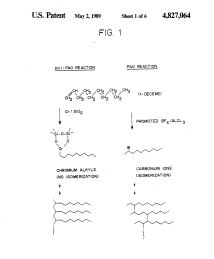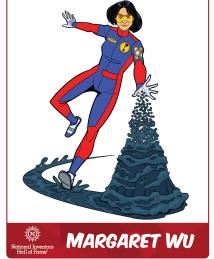Margaret Wu
"A little daydreaming is helpful. I’m sure my boss would think I’m goofing up by daydreaming, but a little bit of daydreaming, a little bit of thinking, wildly helps."
Industrial chemist Margaret Wu revolutionized the field of synthetic lubricants. Her work has changed how automobile and industrial lubricants are designed and synthesized, resulting in products with better machine protection, improved energy efficiency and reduced waste oil.
Wu was born and raised in Taiwan. Her parents, who had left mainland China as refugees, emphasized the importance of education. Her father, a meteorologist, often led discussions about weather patterns that sparked an interest in science among his children, each of whom went on to pursue careers in STEM.
After Wu’s older brothers had begun studying mechanical engineering and electrical engineering, her mother suggested she focus on chemical engineering. “I think that’s a unique thing about my upbringing,” Wu said in an interview with the National Inventors Hall of Fame®. “They [my parents] pointed the direction for me to go, and it’s the right direction. I’m very grateful for my mother who, at that young age, told me what to do.”
Wu earned her bachelor’s degree in chemical engineering at the National Taipei University of Technology in 1970, then came to America to continue her studies at the University of Rochester, where she received a full scholarship. Here, while earning her master’s degree in 1974 and doctorate in 1976 in physical organic chemistry, she met many supportive people, including professors, classmates and members of the university’s Chinese Students’ Association, who helped her through the challenges of living in a new country and completing graduate studies. She has since described Rochester as a city that “represents the best part of America.”
In 1977, Wu began working at Mobil Chemical Co. At the time, she was one of just three women chemists holding doctorates at the company. She noted that over time, the company hired more women scientists at all levels and developed a more inclusive workforce.
By the mid-1980s Wu had begun developing a new class of molecule, polyalphaolefin (PAO), for use in synthetic lubricants. Describing her work, she said, “The novelty of our product is that it has a very elegant chemical structure. It is put together in a very uniform manner and has no extraneous undesirable side branches.”
Wu’s series of new PAO synthetic base oil demonstrated superior lubricating properties with greater wear prevention and less friction in formulated products. This resulted in improved engine performance, oil life and fuel economy, as well as reduced engine wear and waste oil.
A dedicated lab chemist, Wu believes her years of working in laboratories were critical to her success. “When I am in a lab, ideas flow to me,” she said. “I really think it’s important for creativity, for progress and for my personal well-being, to work in a lab.”
Today, synthetic lubricant products based on Wu’s work are used in myriad applications, from passenger car engines to industrial machines such as wind turbines. Wu retired from ExxonMobil Research and Engineering Co. in 2009 as senior scientific adviser, the highest technical rank in the company, and was the first woman to fill that role. She continued as emerita and consultant until 2016.
Wu, who holds over 100 U.S. patents, has personally visited children participating in the National Inventors Hall of Fame education program Camp Invention®, encouraging the next generation of innovators to continue pursuing their interest in STEM.


